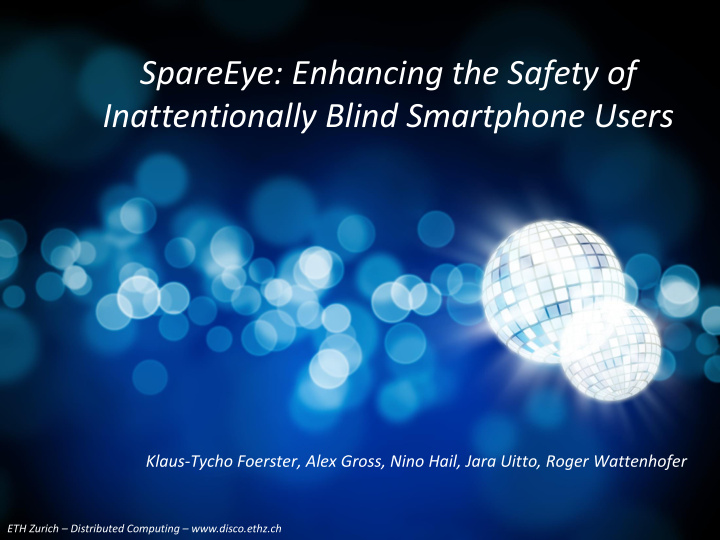



SpareEye: Enhancing the Safety of Inattentionally Blind Smartphone Users Klaus-Tycho Foerster, Alex Gross, Nino Hail, Jara Uitto, Roger Wattenhofer ETH Zurich – Distributed Computing – www.disco.ethz.ch
People don’t pay attention when using their phone
People don’t pay attention when using their phone
Pedestrian injuries due to mobile phone use in public places Nasar and Troyer, Accident Analysis & Prevention 2013 (USA) 2010
Campaigns to spread public awareness
Possible solution?
Or maybe a guide?
Maybe there should be signs?
There actually are!
Or even dedicated lanes!
Once you focus, unexpected events are hard to detect Familiarity with an inattentional-blindness task does not improve the detection of unexpected events Simons, i-Perception 2010
People do not pay attention (while using their phone)! Did you see the unicycling clown? Inattentional blindness while walking and talking on a cell phone Hyman et al., Appl. Cognit. Psychol. 2010
Let’s use technology!
A Blind Mobility Aid Modeled After Echolocation of Bats Ifukube et al., IEEE Tr. Biomed. Eng. 1991 Use ultrasound to recognize obstacles like bats
Obstacle Detection and Avoidance System for Visually Impaired People Shin and Lim, HAID 2007 Ultrasound sensors, recommends walking directions
Ultrasonic Cover Samsung, 2014 Ultrasound sensor, vibrates when detecting obstacle
Obstacle Detection and Avoidance System for Visually Impaired People Bernabei et al., IPIN 2007 Infrared sensor (Kinect), recommends walking directions
CrashAlert: Enhancing Peripheral Alertness for Eyes-Busy Mobile Interaction while Walking Hincapié-Ramos and Irani, CHI 2013 Infrared sensor (Kinect), walking user interface
Why not like this?
Just display the camera image? Type N Walk app, 2010 Apple patent, 2014 Does not work well in practice! E.g., Cognitive control in media multitaskers Ophir et al., PNAS 2009
Walksafe: a pedestrian safety app for mobile phone users who walk and talk while crossing roads Wang et al., HotMobile 2012 Detect cars with the camera while calling
Our approach Klaus-Tycho Foerster, Alex Gross, Nino Hail, Jara Uitto, Roger Wattenhofer ETH Zurich – Distributed Computing – www.disco.ethz.ch
Holding angle ~ 45°
Background
Background Back- ground
~ 2 Meters < 1 Meter
User
Collision! User
No danger User
Multiple Obstacles User
Multiple Obstacles ? ? ? ? User
Multiple Obstacles User
Multiple Obstacles User
? ? ? ? User
Match! Match! User
Testing scenario: university cafeteria
Testing scenario: university cafeteria
Evaluation • 21 participants – 18 male, 3 female (mean age of 29 years) – walks from 26 to 97s (avg = 62.2s, sd = 21.9s, med = 58s) • 103 warnings in total – 87 true positives (avg = 4.1, sd = 1.8, med = 4) – 16 false positives (avg = 0.8, sd = 0.8, med = 1) • 6 failures to warn (avg = 0.3, sd = 0.5, med = 0) • Did not warn: ~ 6% • False warning: ~ 15%
Testing scenario: university cafeteria
Limitations and Future Work
Limitations and Future Work
SpareEye: Enhancing the Safety of Inattentionally Blind Smartphone Users Klaus-Tycho Foerster, Alex Gross, Nino Hail, Jara Uitto, Roger Wattenhofer ETH Zurich – Distributed Computing – www.disco.ethz.ch
Recommend
More recommend